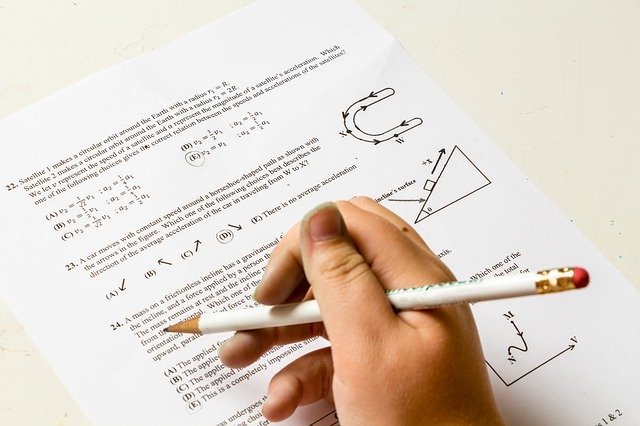As a teacher I often wonder why children take a risk to plagiarize and copy other peoples’ work? This is an important question to ask because teachers are tasked with teaching students good morals and honest behavior.
Plagiarism and Cheating Are A Big Problem Where I Live

Plagiarism and cheating are large problems for educators where I live in Aceh, Indonesia. One reason students plagiarize school papers and cheat on exams is because they want to get good grades and progress in their classes. Students use a wide variety of dishonest tricks to do this and focus more on earning easy passing grades through cheating rather than from actually learning course material. source
This is quite a serious problem because it creates a culture of dishonesty. This culture has major consequences such as eroding students' self-confidence, students becoming lazy, students lacking enthusiasm for earning good grades, and increases in other inappropriate behaviors.

I have tried asking my students directly why they choose to cheat and copy other people’s work then turn it in by pretending it is their own work. I found that the answer to this question varies greatly. Some cheat because they lack confidence in their own abilities. Others cheat because of peer pressure from friends.
I tried to do research to find out why students choose to plagiarize and cheat. The data I collected was from reading literature from various sources.
According to my research, students cheat for the following reasons:
- They don’t learn or understand the material covered in class.
Examinations are done as part of the learning process to test what students learn in class. Students who don't understand or learn class material may struggle to be successful on their exams. To pass, some students will plagiarize or cheat to earn higher grades.
- A student doesn’t feel confident.
Some students choose to cheat/plagiarize because they don't have confidence. Often, students may feel inadequate or fearful of getting the wrong answer. Because of their lack of self-esteem, students sometimes cheat/plagiarize to ensure they do well on assignments. I've often found that students may lack self-esteem even when they learn and understand material.
- A teacher fails at their job of supervising an exam.
Sometimes teachers fail to monitor their students appropriately, leaving students with easy opportunities to cheat. Teachers cannot ignore students in a classroom during exams. It is a teachers job to watch and guide their students. In some cases a teacher does a bad job of supervising students and the children take advantage of this weakness in the classroom structure.
- Students feel pressure from peers.
The influence of peers can impact less confident students. If a student sees their peers succeeding while they struggle, it may push them to cheat to catch up with their classmates. Students may tease or bully others who don't do as well in school. Peer pressure to do well to avoid harsh criticisms from peers can influence some students to cheat/plagiarize.
- The penalties for cheating are weak.
When schools don't penalize students in effective ways, students may take chances cheating and plagiarizing. Students aren't fearful of the repercussions of dishonest practices when the punishments are weak. Schools need strong rules and penalties for cheating/plagiarism to discourage students from attempting to be dishonest.
- Rank and value are appreciated more in our society than honesty.
In our society, students focus more on their rank and value their status over being honest and moral. Students want to be seen as intelligent and gain social status for having good grades. Even though students enjoy having high social status, they don't always want to put in the hard work needed to earn their rank. Instead they choose to cheat to achieve success without truly earning it.
Reference:
http://aceh.tribunnews.com/2012/04/20/kami-tidak-menyontek-saat-ujian
@agrojaya

You stated correctly when you said that the answer varies. And that depends on the culture. I'm also a teacher, and looking back to my schooling years, which I must confess that I cheated a couple of times, there's a trait that I could relate to other students after I became a teacher. And that's motivation!
Some students don't feel motivated about learning. They tend to see school like a train station they must stop before arriving to their destination, which is graduation.
And sometimes, it is not entirely their fault. In some places, the education system must be revised. I know that we must test students to know if they're assimilating the knowledge. But at the same time, it is better not to put a lot of emphasis on grades because students usually study to pass a test and not to understand, find and formulate new concepts.
I firmly believe that teachers must teach student how to think. That nurtures creativity, enforces confidence, and solidifies self-steam. Because when the students are motivated in a dynamic environment, they can feel themselves integrated into the learning process, which makes them care about their own development.
This is a great content displayed in this post. This topic is sometimes overlooked and treated slightly. And if we want to progress and evolve, this is something that needs further analysis and discussion from teachers, students and parents.
I think plagiarism is common, but it must be eradicated, because I am including anti-plagiarism
Yes, I agree with your opinion
the penalties are quite severe here actually, i suppose if you have consequence big enough, people won't dare try.
so we have to fix it for the future, so that students cultivate all the problems with their own ability.